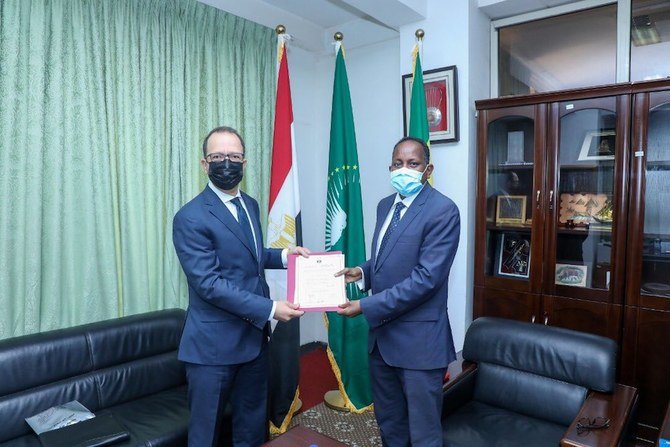CAIRO: Mohamed Omar Gad, the new Egyptian ambassador to Addis Ababa, presented his credentials to Ethiopian President Sahle-Work Zewde.
The official Ethiopian News Agency reported that Zewde had received credentials of a number of foreign ambassadors, including from Egypt, New Zealand, Denmark, Djibouti, Australia, Thailand, and the EU.
On June 22, Egyptian President Abdel-Fattah El-Sisi announced the appointment of Gad as an “extraordinary ambassador” to Ethiopia. He succeeded Osama Abdel-Khalek, who held the position since 2018 before he was appointed as his country’s permanent representative to the UN.
A few days ago, Gad met with and presented a copy of his credentials as ambassador to Ethiopia to Faisal Ali, director of the protocol department at the Ethiopian Ministry of Foreign Affairs.
During the meeting, Ali called for building on the historical relations between the two countries and achieving cooperation in common natural resources. He also wished the Egyptian ambassador success in his new mission.
Gad talked about the importance of establishing cooperation between the two countries in light of their connection to the Grand Ethiopian Renaissance Dam on the Nile River.
On Sept. 26, the Ethiopian ambassador to Egypt, Marcos Tekele, announced the suspension of the Ethiopian embassy in Cairo beginning this month.
In statements to the BBC, Tekele said that his country decided to suspend the embassy’s work in Cairo for a period of three to six months, starting this month, for financial and economic reasons related to reducing the costs of running the embassy.
“The closure decision is not related to the crisis of the Renaissance Dam between the two countries at the present time,” the Ethiopian ambassador said.
Tekele said the commissioner of the embassy will manage it and take care of Ethiopian interests in Cairo during that period.
Egypt, Sudan, and Ethiopia have been negotiating to no avail since 2011 to reach an agreement on filling and operating the Grand Ethiopian Renaissance Dam and guaranteeing each country’s rights to the Nile waters.CAIRO: Mohamed Omar Gad, the new Egyptian ambassador to Addis Ababa, presented his credentials to Ethiopian President Sahle-Work Zewde.
The official Ethiopian News Agency reported that Zewde had received credentials of a number of foreign ambassadors, including from Egypt, New Zealand, Denmark, Djibouti, Australia, Thailand, and the EU.
On June 22, Egyptian President Abdel-Fattah El-Sisi announced the appointment of Gad as an “extraordinary ambassador” to Ethiopia. He succeeded Osama Abdel-Khalek, who held the position since 2018 before he was appointed as his country’s permanent representative to the UN.
A few days ago, Gad met with and presented a copy of his credentials as ambassador to Ethiopia to Faisal Ali, director of the protocol department at the Ethiopian Ministry of Foreign Affairs.
During the meeting, Ali called for building on the historical relations between the two countries and achieving cooperation in common natural resources. He also wished the Egyptian ambassador success in his new mission.
Gad talked about the importance of establishing cooperation between the two countries in light of their connection to the Grand Ethiopian Renaissance Dam on the Nile River.
On Sept. 26, the Ethiopian ambassador to Egypt, Marcos Tekele, announced the suspension of the Ethiopian embassy in Cairo beginning this month.
In statements to the BBC, Tekele said that his country decided to suspend the embassy’s work in Cairo for a period of three to six months, starting this month, for financial and economic reasons related to reducing the costs of running the embassy.
“The closure decision is not related to the crisis of the Renaissance Dam between the two countries at the present time,” the Ethiopian ambassador said.
Tekele said the commissioner of the embassy will manage it and take care of Ethiopian interests in Cairo during that period.
Egypt, Sudan, and Ethiopia have been negotiating to no avail since 2011 to reach an agreement on filling and operating the Grand Ethiopian Renaissance Dam and guaranteeing each country’s rights to the Nile waters.

